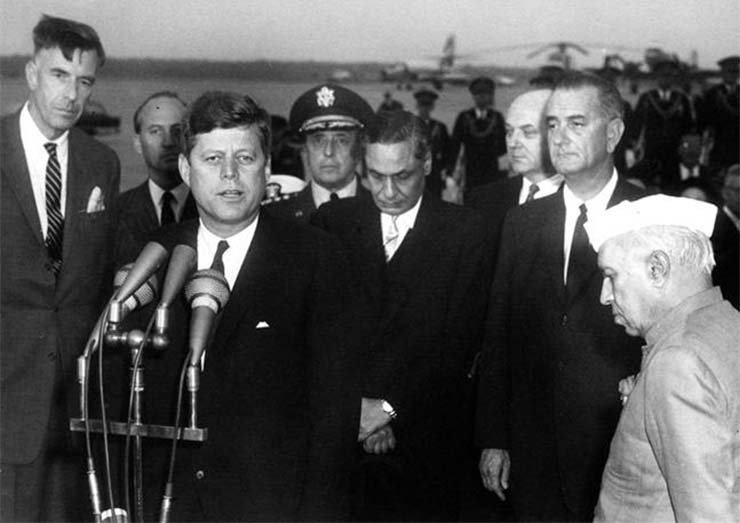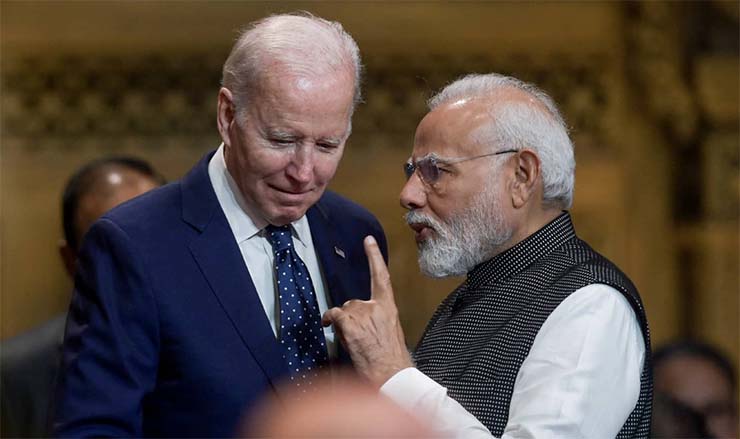
Call it the US’s Cold War era mindset or Washington DC’s uncanny ability to cut the same branch of the tree on which it sits; it has risked to challenge its ties with India which it describes as a “natural ally” as it is crucial for the US to counter China’s aggression in the Indo-Pacific region – all this, for keeping ‘Khalistan movement’ simmering and harbouring those who want to hurt India’s territorial integrity.
The recent cancellation of the planned visit of US President Joe Biden to India as the Chief Guest at the Republic Day 2024 function, is seen in the backdrop of the recent strain which has set in the bilateral Indo-US relations.
In September, India-based US Ambassador Eric Garcetti told reporters that Prime Minister Narendra Modi extended an invitation to President Biden when the two leaders held a bilateral meeting on the margins of the G-20 Summit in New Delhi. Cancellation of Biden’s visit has also impacted Quad’s scheduled summit, too.
People familiar with the development said that the Indian side has now proposed to hold the Quad summit later in 2024, instead of organising it on January 27. “The Quad summit in India is proposed to be held later in 2024. We are looking for revised dates which work with all the Quad partners,” said a person familiar with the issue.
Though US calls India as its ‘natural ally’, additionally India is very crucial for its plans to counter China and for the Indo-Pacific yet it does not act on genuine demands of India regarding Khalistani terrorists
It is learnt that despite pressing domestic situations, both Japanese Prime Minister Fumio Kishida and Australian Prime Minister Anthony Albanese were ready to visit India for the Quad summit provided US President Biden went ahead with his trip in January 2024. But the US’s preoccupation with the Middle East crisis and presidential campaign for the next year’s election were given as reasons for Joe Biden’s cancellation of the planned visit to India.
Undeniably, these are mere excuses. In reality, the US has, through the cancellation of the presidential visit, sent a message to India that there is a strain in relations and New Delhi can address it by cutting ties with Russia and not engaging with Moscow in any kind of trade and economy that keeps President Putin stay in power in the country.
Analysts also opine that based on the foiled plot to kill Gurpatwant Singh Pannun, an American citizen and wanted terrorist in India, the US thinks it has found a potent weapon to pressurise India to follow their geopolitical agenda.
America has accused an Indian government official for his alleged involvement in the foiled attempt to kill Gurpatwant Singh Pannun, who openly threatens to attack Indian interests, including the parliament.
To take-up the matter with Indian officials, US President Joe Biden first sent CIA Director William Burns to New Delhi in early August, who according to the Washington Post told the head of the Research and Analysis Wing (R&AW) Ravi Sinha that “India needed to investigate (the plot) and hold those responsible accountable, and the United States needed an assurance that this would not happen again”.
The US by cancelling the presidential visit, sent a message to India that there is a strain in relations and New Delhi can address it by cutting ties with Russia and not engaging with Moscow in any kind of trade and economy
Then on December 11-12, FBI Director Christopher Wray arrived in India and met CBI Director Praveen Sood and NIA Chief Dinkar Gupta and assured them that the US is “aggressively” probing attack on the Indian Consulate in San Francisco and will be sharing “credible” leads soon on the attack.
In March 2023, a group of pro-Khalistan backers attacked and damaged the Indian Consulate in San Francisco. It was again attacked in July. While anti-India elements, including Sikhs For Justice (SFJ) Chief, Gurpatwant Singh Pannun keep on threatening India from the American soil – all this in the name of freedom of expression.
Indian officials firmly told their US counterparts that America has become a safe haven for terrorist outfits and that there exists a nexus between terrorist elements and members of organised criminal syndicate who operate from the American soil. India has sought extradition of SFJ Chief Pannun.

Arindam Bagchi, Spokesman MEA said, “He is wanted by our agencies for violating the law and there is a process under which we seek assistance, ensuring these elements are prosecuted, depending on where the crime is committed. In our case, I think request have gone through detailing the kind of crimes that he is responsible for, in India…We have also flagged concerns to our partners regarding any threats made by extremists or terrorists against India or Indian diplomats”. Along with this, India also highlighted the matter related to extradition, including that of 26/11 Mumbai terror attack co-conspirator Tahawwur Rana.
Overall, what hurts India is that a Khalistan plot is allowed to be hatched inside America and Canada by both state and non-state actors for years. They raise money, train people and campaign uninterruptedly for the division of India. Pakistan’s ISI plays a midwifery role in promoting Khalistan plot on the western soil.
As per media reports, the despicable spy agency of Pakistan provides funds to intensify Khalistan movement against India from Canada. It provides funds to key Khalistani leaders, for promoting their anti-India activities. Altogether they help in fanning hatred against India. Consequence was there before the world to see. Indian diplomats were targeted, religious places were vandalised and those opposed to the Khalistan movement were attacked in Canada.
India is clear headed in its approach to the developments; it wants the US and Canada to cooperate with New Delhi in identifying anti-India elements and their subsequent extradition to India to face trial
The Prime Minister Justin Trudeau-led Canadian government overlooked such criminal activities of terrorists despite being provided with specific evidence by India. Now the Canadian Prime Minister makes allegations against India over its involvement in the killing of pro-Khalistan leader Hardeep Singh Nijjar with an intention to “put a chill” on New Delhi.
In an interview with The Canadian Press news agency, Trudeau recently said he made allegations against India in his speech in the House of Commons on September 18 in order to ensure that it helped in creating an “extra level of deterrence” for the safety of Canadians.
Evidently, by making such statements, the Canadian Prime Minister has made him and his country targets of mockery, even as some of the western allies are still waiting for his government’s response to New Delhi’s demand for sharing any evidence linking India’s hand in the Najjar killing.
In diplomatic circles, for scoring points, no one else except for the US, wants to keep the pot boiling to keep India in check, and none is categorically supporting the US in this as much as Canada.
However, India is clear headed in its approach to the developments; it wants the US and Canada to cooperate with New Delhi in identifying anti-India elements and their subsequent extradition to India to face trial. Besides, in more than one way, the development has exposed western duplicity on the counter-terrorism front, while serving a clear message to India on its over-reliance on the US at a time when more than one-year long Ukraine war and two-months-old Hamas-Israel conflict have left their telltale signs on the geopolitics of the world.
–The writer is a senior journalist with wide experience in covering international affairs. The views expressed are of the writer and do not necessarily reflect the views of Raksha Anirveda















